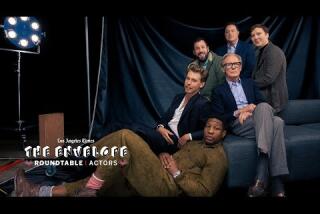Fathers, Families and Values
- Share via
With Father’s Day looming, time for another look at family values.
You could say that Ma Barker had family values. The Menendez brothers, too, along with Charlie Manson, the Borgias and the Corleones. They just weren’t your family’s values.
These glitches in humankind notwithstanding, the absence of a universal definition remains the major rub when it comes to implementing a particular set of values on television as part of wholesale reforms that many of its nostalgia-driven detractors continue to demand. Values are no more a monolith than the families espousing them.
Another rub is that the wholesome family ethos often held up as an ideal may not even exist.
Take the Nelsons.
When many critics of TV advocate enclosing prime time behind a white picket fence, you’ve a feeling it’s those 435 episodes of “The Adventures of Ozzie and Harriet” they have largely in mind:
* The loving, somewhat befuddled dad who stays close to the comfortable, upper middle-class home that he is able to maintain for his family while never seeming to have a job.
* The mom who is ever loyal, capable and contented.
* The kids who are sweet most of the time, yet when they’re in a rotten mood, watch out. Then they’re merely nice.
Playing themselves, or so it seemed, the Nelsons were lovably pure, enduring on ABC spotlessly from 1952 to 1966. In 1954, TV Guide called them “everything a family should be,” representing “all that is fine about family life.”
And compared with the typical American family, all that was unreal.
The objects of this worship were former radio performers Ozzie and Harriet and their sons, David and Ricky, arguably the most sanitized family ever to occupy a TV sitcom. More angelic and unblemished even than the Andersons of “Father Knows Best,” the Cleavers of “Leave It to Beaver” and all of Donna Reed’s straight arrows.
No family in prime time has ever out-goshed and golly-geed the Nelsons. Nor been as devoid of serious problems. Nor approached life as simplistically on all levels. Nor out minimized them when it came to expressing the routine of daily living. Nor been more beloved, despite this surreal environment. Or perhaps because of it.
Here was a Ozzie and Harriet opening:
“Hi, Mom.”
“Hi, Dave.”
“Hi, Pop.”
“Hi, Dave.”
“Hi, Pop.”
“Hi, Rick.”
“Hi, Mom.”
“Hi, Rick.”
And that was an argument.
The hook for this little retrospective is “Ozzie and Harriet: Adventures of America’s Favorite Family,” a new “Biography” from cable’s Arts and Entertainment network, a program that’s most notable for its double-sized two-hour length. It’s fat but tedious, as much a meandering talking-heads monotone as an Ozzie and Harriet dialogue. Moreover, it never validates what seems to be its main theme that, as “The Fifties” author David Halberstam is shown saying here in a C-SPAN interview, “. . . the Nelsons were something of a dysfunctional family” even though “they were the ideal to all those American families back in the ‘50s.”
Well, c’mon. Compared with such on-screen virtuosity, who wouldn’t appear dysfunctional? Yet the time frame is off, and these supposedly dueling Nelson personas, on-screen vs. off-screen, don’t quite intersect in this Peter Jones documentary. The real dysfunction, based on what’s presented here, came after the Ozzie and Harriet series had ended, finally collapsing under the weight of its own irrelevance, and David and the charismatic but troubled Rick had become adults with lives and families of their own. That comes through here in interviews with Rick’s ex-wife, Kris, and others.
If the Nelson family of the ‘50s and ‘60s was anything more than flawed, as all families generally are, this documentary doesn’t show it.
That’s not to say the off-screen Nelsons were replicas of the on-screen Nelsons that many would like today’s sitcoms to emulate. There were some parallels, such as Rick’s burgeoning career as a singer and teen heartthrob being incorporated into the show, with young girls shown being poised to swoon at every note.
Yet the mellow, often ineffectual Ozzie whom millions of Americans grew to love, for example, was, in fact, the driven, perfectionist wizard of Ozzie who kept his thumbs on every lever of the show and gave the impression that “The Adventures of Ozzie and Harriet” was, indeed, his family’s reality. He was so protective of the show’s image, we’re told in the documentary, that when Rick and Kris’ first child, Tracy, was born, Ozzie had her birth certificate altered to hide the fact that Kris had been pregnant when she married Rick.
According to Tracy Nelson, meanwhile, Harriet at times wore no underwear under her dresses while singing professionally before marrying Ozzie, and she “smoked Marlboros from the time she was 13.” In contrast to his squeaky cleanliness on the show, moreover, Ricky is said to have lost his virginity at age 14.
Although hardly the stuff of Jekyll and Hyde, this departs dramatically from the Ozzie and Harriet fantasy, and should be a lesson to viewers about separating TV from real life and the futility of worshiping imagery created by Hollywood.
More to Read
The complete guide to home viewing
Get Screen Gab for everything about the TV shows and streaming movies everyone’s talking about.
You may occasionally receive promotional content from the Los Angeles Times.






